Sport and Exercise Medicine: The UK trainee perspective – A BJSM blog series
By Dr Dane Vishnubala @danevishnubala
Earlier this year, Public Health England (PHE) put out a job advert for GP Clinical Champions. The job involved educating clinicians on: (i) the benefits of physical activity in primary and secondary prevention of disease and (ii) the harms of inactivity.
As I was just finishing GP training and about to embark on Sport and Exercise Medicine training, the idea of teaching and talking about exercise and health sounded perfect. So I applied and got the role as a Clinical Champion.
The clinical champion network is definitely an interesting initiative and one worth sharing with you.
So lets start at the beginning- why is there a need for the physical activity champions network?
Inactivity in the UK
Inactivity is a major problem in the UK. The statistics do not paint a pretty picture. As well as GPs, this is a great opportunity for the SEM community to make a difference and show a different side to our specialty.
Key facts
* I have taken most of the statistics from the Every body Active, Every day document by PHE that is well worth a read.
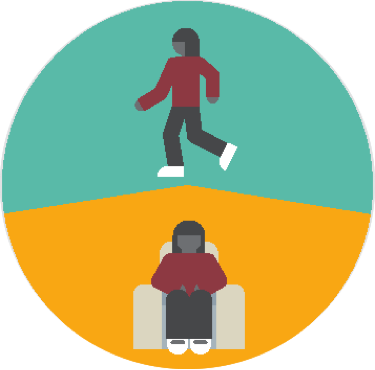
45% of women are not active enough for good health
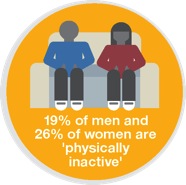
19% of men and 26% women are physically inactive.
We also know that as well as females, ethnic minorities and those who identify as lesbian, gay or transgender are all likely to be less active. As you can see inactivity is a major issue and we must look at ways of tackling this whilst ensuring we also involve these harder to reach subsections of the populations.
Graph in terms of risk to mortality:
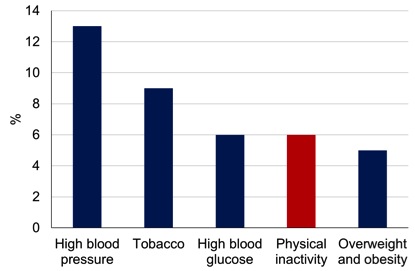
How do we compare to other countries?
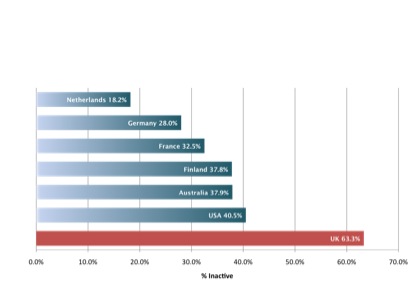
Poorly would be the answer! *Note the definition of inactivity in this study is different to the one used previously.
Here is the recent info graphic launched in England at the last PHE conference to get across the key messages of the UK CMOs’ guidelines. An infographic for children 5-18 years is currently under development.
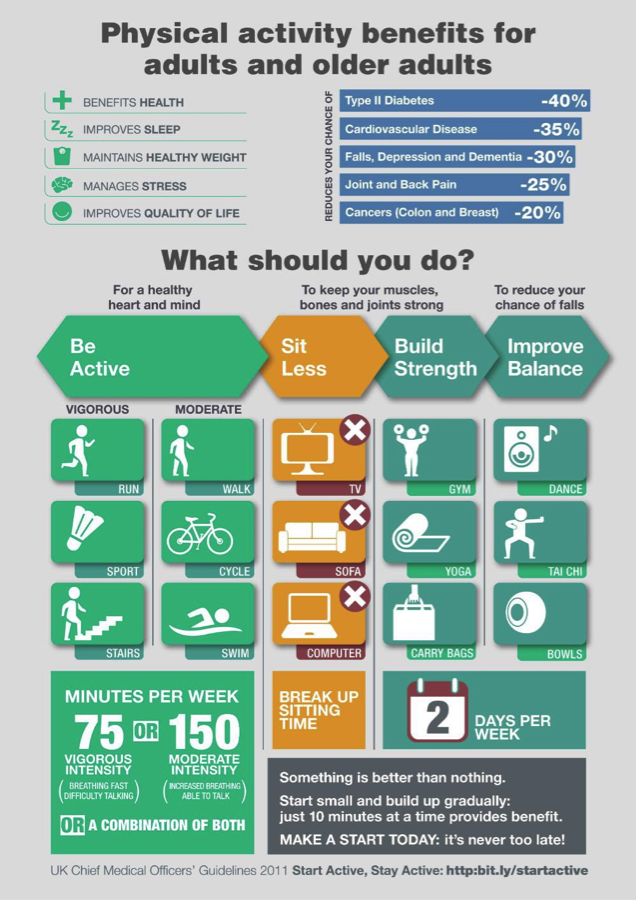
The Clinical Champion Programme
Aims
We know from research that we as clinicians in all specialties can make a bigger impact. We have a lot of patient contacts and opportunities to change behaviour.
The aim of the Clinical Champion Programme is to educate clinicians around the following:
- Physical activity and it’s benefits
- Risks of inactivity
- Current inactivity statistics.
- Exercise physiology in primary and secondary prevention
- Making every contact count
- Motivational interviewing
- Local provisions for physical activity
To do this PHE decided to recruit GPs in various areas with an interest in physical activity to deliver the education. GPs were selected after an interview process which including assessing their teaching and presentation skills.
Here is our promotional flyer:
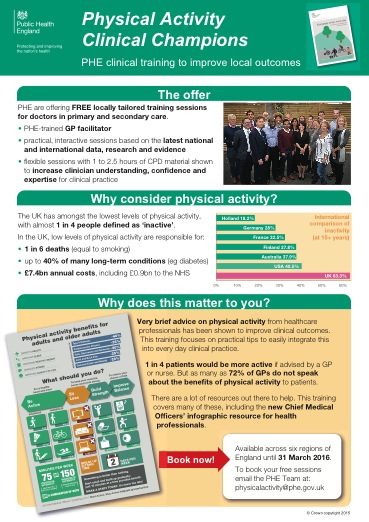
Training
As part of the role, I attended a two day training session, which brought the Champions together for sessions on teaching skills and to review, discuss and practice the materials; it also provided the opportunity to gel as a cadre of professionals. In addition the Champions all attend a national PHE physical activity conference.
The physical activity champions
It was great to see the range of Clinicians in the GP Clinical champion team. As well as the Public Health England team, we have a range of GPs with considerable physical activity experience, some with an MSc in Sport and Exercise medicine, others dually trained in SEM and GP, and even RCGP Physical Activity leads. This range of people has led to some interesting discussions on our team forum and further in team education. I have learned a lot about the public health side of this problem since joining the initiative, as much from the other champions as well as the training.
Delivery Experience
The education has been tailored to be either 30min to 2-3 hours approximately. I have delivered to VTS groups, GP groups, hospital specialty and trainee groups and grand rounds amongst others so far. The variety of specialties and the length of time can be a challenge however PHE has presentation and lesson plans for different groups. There has been some travelling to do and I have delivered in Yorkshire, Lancashire region and even one in London. The general feedback from the physical activity champions is that the training has been well received and that we are providing education in an area not provided at medical school or usually further training unless you happen to be a sport and exercise medicine or public health trainee!
Top 5 tips for clinicians
- Understand the patient, their motivations and barriers- softer GP skills are definitely useful here.
- Motivational interviewing or elements of it can be helpful in behaviour change.
- Understand local provisions so that you can signpost appropriately for that individual.
- Remember that even if you don’t make a change today, you may cause a change later- don’t underestimate the impact we can have.
- MAKE EVERY CONTACT COUNT! Prevention is always better than finding a cure!
Further resources
- PHE- Clinical Champion Teaching session– Contact physicalactivity@phe.gov.uk
- Motivational interviewing- BMJ http://learning.bmj.com/learning/module-intro/.html?moduleId=10051582
- BMJ Learning Modules. http://learning.bmj.com/learning/course-intro/physical-activity.html?courseId=10051913
- Intelligent health http://www.intelligenthealth.co.uk
- Motivate to Move: http://gpcpd.walesdeanery.org/index.php/welcome-to-motivate-2-move
- Exercise Works http://www.exercise-works.org
Can you help?
Can you help us spread the message? If you feel any groups of clinicians, you are involved with would benefit from the session then…email us to get a free education session booked in and delivered by one of our Physical Activity Clinical Champions. Contact us at physicalactivity@phe.gov.uk
**************************
Dr Dane Vishnubala MBBS PGCME MRCGP FHEA, is a Sport and Exercise Medicine Registrar in Yorkshire, GP and part time lecturer at Leeds Beckett University in Physical Activity and Health. He has a strong interest in exercise medicine and still actively works in the Exercise Referral industry as a BASES/REPs Level 4 Certified Exercise Professional.
Twitter: @danevishnubala
Email: dane.vishnubala@nhs.net
Farrah Jawad is an ST5 doctor in Sport and Exercise Medicine in London. She co-ordinates the BJSM Trainee Perspective blog.